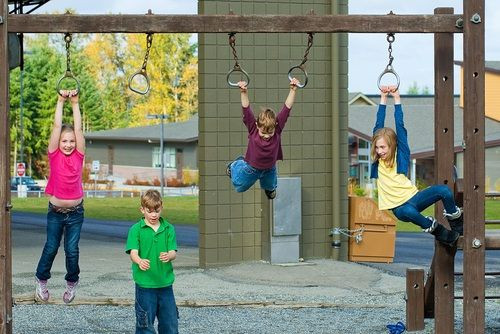A Summer Vacation For Germs: 5 Germ-Filled Activities That Deserve Precaution Before Enjoying

Summertime is right around the corner, and it will bring warmer weather, outdoor activities, and happier moods (hopefully). But before you jump back into your usual warm weather routines, there are a few germy activities that you should be wary of — both adults and children alike.
1. Hot Tub
Hot tubs can be extremely relaxing. The warm temperature and the soothing jets can ease muscle tension and an aching body. However, the warm water can also bring something else — an unhygienic atmosphere. Because of the temperature, it’s harder to disinfect and thoroughly clean a hot tub, so it’s a breeding ground for all sorts of nasty infections. Pseudomonas aeruginosa, a common bacterium found in hot tubs, can cause an infection called a Pseudomonas folliculitis, also known as the "hot tub rash."
According to the Centers for Disease Control and Prevention (CDC), Pseudomonas aeruginosa is commonly found in water and soil. When hot tubs are disinfected, the level of bacteria decreases as the water temperature increases, which ultimately exposes people to infections. "People tend to sit in hot tubs for a while, so their skin is exposed to contaminated water for a while." Dr. Michele Hlavsa, an epidemiologist and chief of healthy swimming for the Centers for Disease Control of Prevention, told The Huffington Post.
If they do contract the bacteria, a rash in the form of the person’s bathing suit will form. The CDC also notes that symptoms like pus-filled blisters around hair follicles and a rash will generally show up a few days after a person has been exposed.
2. Swimming Pool
Swimming in a pool can be a great way to exercise safely, but pools can also harbor disgusting critters. According to a 2010 CDC report, one in eight pools had serious health violations that threatened the safety of those who swam. Another unwanted swimmer might be with you the next time you’re in the pool, and that is the cryptosporidium, also known as a crypto, which is an extremely chlorine-tolerant parasite that can survive in a properly chlorinated pool for 3.5 to 10.6 days.
The CDC also finds that one in five Americans swim while having diarrhea, which can also heavily contaminate the water with crypto and make others sick. It’s also important to remember that chlorine doesn’t kill all of the germs and bacteria in pools. "Many people think that when a pool smells of chlorine, that means that it's clean," said Mary Ostrowski, director of the Chlorine Issues at the American Chemistry Council, a trade organization. "But that smell is actually chloramines, a substance that results from a mix of chlorine and bacteria, urine and sweat,” Live Science reported.
3. Playground
When children are young, playgrounds can be the nexus for all sorts of things. Whether it be exploring new places, making friends, or testing strength, playgrounds are a part of the growing up experience.
In 2007, ABC's Good Morning America conducted a swab test. They took samples from areas around New York, Virginia, Maryland, and Washington. They found that 59 out of the 60 samples contained germs that could make children extremely sick. They also found fecal matter, E.coli, Salmonella, hepatitis A, Shigella, strep-B, and Staph. This will of course give your children more than just a little cough, since contracting any of these could cause adverse reactions.
Of course, by nature, little children are germ-filled and oftentimes exposing them to germs when they are young will help to build and strengthen their immune system. It’s unreasonable to ask your little tot to stay away from the swings or monkey bars, so teaching them good hygiene techniques such as washing their hands after they’re done playing can help keep them healthy.
4. Bouncy Houses
They’re bouncy and they’re fun, so who wouldn’t like a good jump in one of them? Well, they might also be bouncing with bacteria, too. 3 On Your Side, a local investigative news branch conducted an investigation and found that these plastic houses were filled with bacteria. “One thing that seemed surprising was the clustering and the concentration of the bacteria,” according to Dr. Stan Kikkert, a biology professor at Mesa Community College, 3 On Your side reported.
However, Kikkert does say that the germs could be either viruses or bacteria and that the amount and type of exposure could make you sick. "It really depends on the amount of exposure, their own personal immune system, and how good they are about washing their hands after they've played in the bouncy houses,” he said. He also suggests that it won’t do any good to be fearful — being hygienic and aware is most important.
5. BBQ Grills
Summer is barbeque season, but before you start lighting up your grill there are a few precautions that you should take. Leaving your barbeque grill exposed to the elements is a bad idea. If a bird happens to pass by and leave droppings on your grill, the bacteria might not necessarily go away if you wash and clean it off. Heat doesn’t guarantee cleanliness either — “the heat created by the grilling process cannot guarantee that these viruses and bacteria will be killed,” according to Yahoo.
Be wary of tiny animals, too. If they unfortunately get stuck in the grill and die, then the resulting smoke and flames can cause your meat or vegetable to be contaminated. Word to the wise: Always keep your grill covered, even if you use them often and when you do, use foil paper and grill baskets that can be thrown out or washed.
All five of these tips are meant as guidance, and with a little care and common sense, you and your children can enjoy a safe and happy summer.
Published by Medicaldaily.com



























